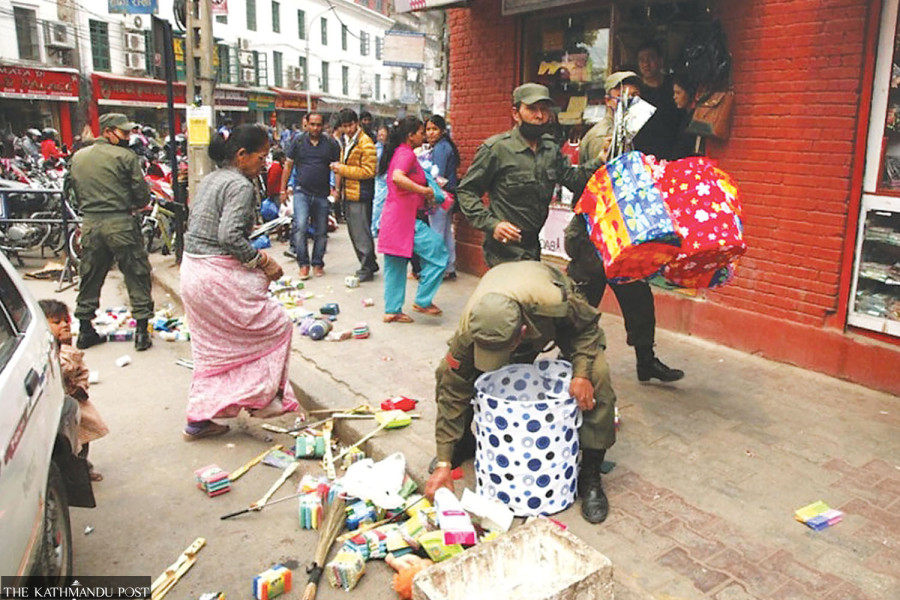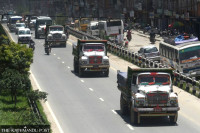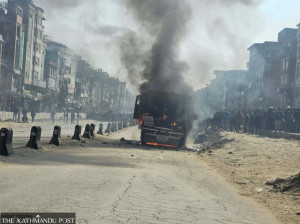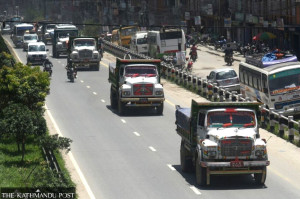Bagmati Province
Kathmandu street vendors lament lack of options two years since ban
City is cleaner and better, but its benefits are not reaching the economically disadvantaged residents relying on street vending for livelihood, they say.
Manushree Mahat
Every day, fifty-seven-year old Menuka Basnet sets up her pushcart on the streets and back alleys of Old Baneshwar to sell grilled corn. She is a widow, mother to three children, and the sole earner in her family. She says she earns about Rs300-400 a day, which is hardly enough, but she has been doing this for over a decade now, as she sees no other way to make a living.
“I’m at an age when I shouldn’t have to do all of this, but look at me. I have no choice, and I have to hide to do my business,” she says.
Her husband died of heart problems, her daughter recently underwent a surgery, and she herself has intestinal problems. She lost her house and property after failing to pay her loans.
“My family and I have spent days in hunger, living in the cold,” she says.
“Every day I come here to sell corn, but there is no business,” she adds.
All she asks for is some space to do her business properly. But she has been feeling hopeless for some time, and any hope that the local authorities or the government will intervene to improve the quality of life of her family is fading away.
Ever since Kathmandu Mayor Balendra Shah imposed a ban on street business in an attempt to improve pedestrian space and reduce congestion, street vendors have seen a sharp drop in their earnings. Most of them now have to sell their goods either early at the crack of dawn before the municipal police become active or in the evening, fearing that their goods will be confiscated.
Lal Babu Sah, a fruit seller, earns half of what he used to. He supports his family of four as the sole breadwinner, and as a street vendor, he must constantly dodge the police to make ends meet.
Despite the difficult position he is in, he still believes that Mayor Balendra has done good to the country.
“The city is cleaner than it used to be, and he’s taking measures that contribute to the development of the country,” says Sah. “We just hope his development measures will also help us poor people,” he adds.
Sah further adds that simply providing an alternative location or time for street vendors to do their business would be enough.
“As soon as the police spot us, they seize our goods. If they just designate a space for us to do our business, we’d gladly accept it,” Sah says.
Fifty-five-year old Rajkumari Gurung has been in the street business for 14 years now. She sells vegetables and flowers. She too acknowledges the positive impact of the mayor’s efforts to clean the city. But she laments that the benefits of these improvements are not reaching the city’s economically disadvantaged residents, who are unfairly being targeted.
Due to the ban on street vending, Gurung can only sell her goods only in early mornings and during evenings. This has hit her sales and income.
Despite repeated attempts by street vendors to seek justice for the harassment they face from the municipal police and strict rules imposed by the metropolitan office, nothing concrete has been done to address their concerns or to manage street business. Experts, urban planners and activists have protested the municipal crackdown on street vendors, but nearly 2 years later, street vendors are still forced to operate covertly either before daybreak or in the evenings.
In an interview with the Post a few months ago, Mahendra Subba, president of Regional and Urban Planners’ Society, highlighted the significance of street vendors for the economy of urban areas. He noted that many countries in and outside Asia, have a lively space for street vendors to do their business with minimal interference.
Street vendors offer affordable goods, catering to the economically disadvantaged segments of society. Moreover, countries like Thailand and Singapore, both economically strong countries, have lively street cultures, showing that with adept management, street businesses reap fruitful results.
Street vendors in Kathmandu are also in favour of the concept of arranging an alternative space and time to conduct their businesses. They are willing to accept the mayor’s efforts to change the city’s landscape as long as they are not unfairly mistreated by the police and do not have to constantly hide to operate.
Nabin Manandhar, spokesperson of the Kathmandu Metropolitan City (KMC) says that they have asked the trade unions of street vendors to set up a location for them to conduct their businesses.
However, Maya Gurung, president of the central committee of Nepal Street Vendors Trade Union, says they have not heard of any updates on their concerns from the municipal authorities as of late.
She further adds that cleaning up street businesses seems to be the only concern of the officials, with little actions planned to ensure the livelihood of the street vendors.
On May 16, the Supreme Court also issued an order for the Kathmandu Metropolitan City to submit an action plan for the management and alternative measures for street vendors.
Rajkumari Gurung says this order has been ignored by the metropolitan city.
“It’s hard not to see the good he has done for the city. But the poor too are a part of this city. If only we could be provided an alternative, we would be happy,” she says.




 20.53°C Kathmandu
20.53°C Kathmandu















